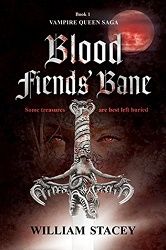This post may piss some people off. I'll start by stating that I'm not trying to be purposely provocative. I'm a blunt man. I spent three decades of my life in uniform, serving numerous tours in violent failed states where mistakes could get people killed. When I see a problem, I fix the problem, or at the very least, I point out the problem. Lately, I've been seeing a problem, possibly facilitated by the rise of indie publishing—fiction writers who fail at research. Bad research will kill a book faster than an unsympathetic main protagonist or a tedious plot.
I’m a fair hand at research. I don’t enjoy it, but I can do it well enough. I write fantasy, urban fantasy, dark fantasy, fantasy disguised as horror, science fiction with a dash of fantasy. But fantasy is always my main genre, and with fantasy, I find that research is an unavoidable requirement. It's like breathing. In the army, I was an intelligence officer. My job was to understand complex topics and summarize the most important points for my chain of command, allowing my commander and his staff to make an informed decision and choose the best course of action. Often, I would spend weeks and months researching topics, ensuring I was always current on the latest developments and had an expert level of knowledge in my assigned area. But—and there’s always a BUT in the army—on occasion there simply wasn’t time to become an expert on a topic before I had to provide guidance. It sucks, but sometimes there just is no time. You do what research you can in the minutes you have and hope for the best. I’m not bragging—hell, maybe I was wrong way more than I was ever right—but I'm bringing this up to demonstrate my background and why I value research so much. Admittedly, this type of high-stress, do or die, environment is vastly different than the life of a fiction writer, but the lessons I learned in the army serve me well as a writer.
Research can be a tricky business with three main hazards for writers to navigate. First, there's the danger of becoming lost in the weeds, of not knowing when to stop researching and start writing. Hazard number two is when you feel obligated to include all the interesting facts you discovered in your book—even when they are inappropriate to the story you're telling. The third hazard, however, is probably the greatest of the three—the danger of 'winging it.' This mistake screams 'amateur.'
With the first hazard, becoming lost in the research, how do you know when enough is enough? It's easy to get too involved in the research. Writing is bitterly hard work, even when you love it. Any activity that isn’t writing becomes a way to avoid the hard work of bleeding words onto the computer screen through your forehead. Sadly, I can't tell you when you've done enough research. There are simply too many variables involved: the type of book you’re writing, the genre, who you’re writing it for, not to mention how well and how fast you work. What I can tell you is this: if you’re unsure if you’ve done enough research, then you probably haven’t. Enough research is when you’re so thoroughly immersed in the subject that you understand it well enough to bore all your friends with your knowledge. How long will this take you? Well, for a fairly complex novel, with subject matter that is unfamiliar to me, I’ll usually spend at least a month digging into the details. Often, I’ll spend a lot more time. Eventually, there will always come a point where I understand the subject matter as well as I need to, and anything more will become a waste of time. That's when I start to write.
Hazard number two: artificially throwing in inappropriate research into your story. I think it's natural to assume that if you find a topic interesting then you believe your readers will also find it just as fascinating. This is rarely true. What usually happens is that readers become bored with a history lesson. Readers come to fiction for the characters and the story; they read to lose themselves in imaginary worlds. While an interesting fact can add to the verisimilitude of a tale, it can also stop a story dead. This is a big problem for me. I always feel obligated to pass my knowledge onto my readers. The problem, however, is that I'm writing fiction, not teaching. I love medieval combat. I find European sword-fighting fascinating, but just because I’ve learned the difference between the 'true edge' and the 'false edge' of a sword, it doesn't mean that readers will also find it fascinating (If you’re one of the few curious ones out there, the true edge is the edge that runs parallel to your knuckles when you grip a sword blade; the false edge is the other side or the back of the sword). In order to decide what you should and shouldn’t put into the book, you have to know your readers and their genre expectations. As a rule, if an interesting fact contributes in some way to the story—without slowing it down or stopping it outright—then I’ll include it, preferably in dialogue. Otherwise I leave it out. In fact, after you’ve done the necessary research, you should make it a habit to leave out most of your 'interesting facts.' At best, include only the most exciting 5-10 percent of your research, just enough to show your readers that they're in good hands because you know what you’re talking about.
Hazard number three: winging it—the danger of not doing any research at all. Personally, I think this might be more of a threat for the pantsers out there, the ones who write without the safety net of an outline, but there are almost certainly many plotters out there as well who think they can fake the research. I know what many of you are thinking: story is king; character development and plot are what really matters, not the correct immediate actions to carry out when you have a stoppage with an M16A1 assault rifle. And you'd be right, but also wrong, because if you ever want to lose a reader who's also a gun nut, throw in an incorrect gun fact. Trust me, get it wrong and you've lost them. Nobody wants to spend time in a story where an author has skipped the research, or assumes they know it all already. Readers can spot a lazy author in about a nanosecond, and they put the book down when they do. I suspect some authors, usually inexperienced, skip research because they're in a hurry to get on with the excitement of telling a story, and research slows down the creative flow. I find fantasy writers particularly guilty of this. When they haven’t done the necessary research, they often just make stuff up—usually getting it all wrong. It's lazy writing. I remember one book where the writer had her hero evading arrows being shot at him by hunters. The problem was that the writer didn't understand how hunters used bows. I think she must have seen a documentary on English archers at Agincourt because she had the hunters shooting their arrows up high into the air so that they'd arc up and then come down where the hero was standing. The hero—being über-cool—simply stood in place watching the arrows, and then at the last moment, stepped out of the way before they came down again. Thing is, hunters don't aim bows in that manner, they actually aim at the target, or where the target is going to be. Hunters are good at what they do; if they're not, their families starve. They adjust for wind and distance, and allow for the rise and fall of the arrow, but they sure as hell don’t aim straight up into the air. That type of arrow shooting is called 'ranged volleys,' and it was only done until the enemy came closer. The reason why the English used ranged volleys during the Hundred Years' War, and Agincourt in particular, was that there were hundreds of archers shooting volleys of hundreds of arrows at thousands of massed French knights. It was an effective way to put a lot of arrows on the target fairly quickly and maybe even bypass the strongest part of the armor on the French knights. At Agincourt, no one archer was aiming at any particular French knight, they were all just aiming at the mass of knights and men-at-arms struggling in the mud to get closer to the English lines (well, okay, that's not quite true either. There were archers shooting point-blank into the flanks of the French as well). When it was appropriate, when the enemy came closer, archers would shoot straight at their foe. This isn’t particularly obscure knowledge, it’s readily available online. Even a tiny bit of research would have shown that author where she was going off course, veering from the suspension of belief into the ridiculous.
So, let's go back over the three hazards one last time. One: don't get lost in the wilds of research. You should absolutely do far more research than you think you'll ever need, but know when to stop and start writing. Two: if a really cool research detail slows or stops your story, DON'T PUT IT IN THE BOOK. And three: don't try to fake out readers with the author equivalent of waving your hands in front of their faces. Once an author has lost credibility as an expert source, he or she has also lost the reader.
Do the work. Do the research. Maybe you'll even find it fun.
About the author:
William Stacey is a former Canadian army intelligence officer who served his country for more than thirty years with operational tours in Bosnia and Afghanistan. He is a husband, father, and avid reader, with a love for the macabre.
For those who want their fantasy laced with heroic adventure.
Visit him online at http://williamstaceyauthor.com
Words of Dark Adventure
Blood Fiends' Bane: Book 1 of the Vampire Queen Saga
Some treasures are best left buried.
Sentenced to five-years’ service as a soldier for a violent crime, Owen Toscovar now serves the noble Dain family as a man-at-arms. Because he is large and powerful, most deridingly refer to the young man as “Horse-Boy,” believing him to be little more than a quick-tempered brute, a tool for violence. But Owen is far cleverer than most suspect, and he bristles under his forced servitude, wishing to experience adventure and see the world beyond his northern Duchy. Owen is about to get his desire.
The Dains, a once proud royal family, have fallen into disfavor, but their fortunes change when a deathbed confession reveals a shocking secret -- the location of the mythical longsword Sight-Bringer. The magical sword was long believed destroyed in an apocalyptic battle fifty years ago that killed the terrifying Vampire Queen, Serina Greywynne. Now, Owen will accompany the new young Dain lord and his sister on an expedition to retrieve the holy relic. They will journey across an ocean and through a monster-filled swamp to the ruins of an abandoned fortress long believed haunted by the ghost of Serina herself.
But the legends are built on lies, and evil stirs in the catacombs beneath the fortress. In the slaughter that follows, Owen must somehow protect the Dain bloodline from an unholy evil, because if he fails, everyone he loves will die.
Intended for a mature audience, Blood Fiends’ Bane is the first book in the Vampire Queen Saga, a dark, gritty tale of sword-swinging-action, blood-curdling horror, and selfless duty in the face of unspeakable evil. Author William Stacey is a 2014 Amazon Breakthrough Novel Award Quarter-Finalist.
Book Links: my review - Goodreads – Amazon(US) – Amazon(CA)



No comments:
Post a Comment